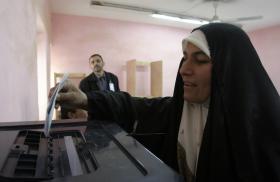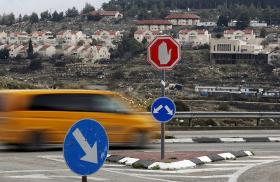
Kataib Hezbollah Sides with Sudani in Power Struggle Against Eidani

The Iran-backed militant group is signaling its seriousness about elections, aiming for better results in heavily populated Basra, and seeking to keep its rivals separated.
Kataib Hezbollah is actively working to drive a wedge between Prime Minister Mohammed Shia al-Sudani and Basra’s powerful governor, Asaad al-Eidani, as part of a broader effort to expand KH influence over Basra, arguably Iraq’s most strategic governorate due to its oil wealth, ports, and coastline. Until recently, Sudani and Eidani were engaged in negotiations to form an electoral alliance for the upcoming elections, but KH may have successfully intervened to derail the talks and deepen a rift between the two.
KH’s campaign against Eidani gained momentum in February 2024 with the formation of the Parliamentary Investigative Committee Under Order No. 87 (Committee Order No. 87), tasked with probing alleged violations by the Basra local government. Committee Order No. 87, which has thirteen members, is chaired by parliamentarian Saud al-Saedi, who also leads Kataib Hezbollah’s parliamentary bloc, Hoquq. The committee members were selected by Muhsin al-Mandalawi, who was acting speaker of parliament and is known for his close ties to the U.S.-sanctioned senior KH commander Abdul-Aziz al-Muhammadawi, aka Abu Fadak, who also serves as chief of staff of the Popular Mobilization Forces.
The committee completed its investigations in February and submitted its final report to the speaker of parliament and his two deputies, one of whom is Mandalawi, in April. Its recommendations remained undisclosed until May 20, when the lawmaker Saedi announced that “due to violations and other concerns related to suspected irregularities in various projects,” the committee had recommended “the dismissal of the governor of Basra and his referral to the specialized courts” (figure 1).
Widening the Sudani-Eidani Rift
KH is now clearly leveraging Committee Order No. 87 as a political tool to influence the upcoming parliamentary elections, as Saedi’s announcement came amid a public rift between Prime Minister Sudani and Governor Eidani.
Recently, Basra governorate launched a campaign to demolish homes built illegally on land described by Basra’s provincial council as belonging to private citizens. This kind of urban cleaning-out of alleged “squatters” and policing of construction lacking building permits is an episodic drama in most Iraqi cities, and it always gets politicized. Videos of the demolitions sparked backlash across Iraqi social media, prompting the prime minister’s office to issue a statement to the governorates on May 19 stressing “the importance of finding an alternative before removing any unauthorized housing. He instructed that necessary measures be taken to halt demolition campaigns targeting unauthorized residential units built on encroached land, particularly those inhabited by impoverished citizens who currently have no alternative shelter...”
This is Sudani playing politics in an election year, riding the coattails of public anger. Yet Eidani has his own election-year priorities, and the two Iran-backed candidates—Sudani and Eidani—got into a public spat. Eidani immediately responded by rejecting the prime minister’s call, stressing that Iraq is a federal state and that the prime minister’s directives are not binding on the governorates. He added that “the governor is elected by the provincial council and is not considered an employee of the central government,” and noted that “the recent directive directly contradicts Article 154 of the Encroachment Removal Law and sets a dangerous precedent that could encourage violations of public and private property.”
KH leveraged its media platforms, including al-Etejah TV, to support Sudani’s stance. Sabereen News, which in recent years has grown increasingly close to KH, echoed the campaign by accusing Eidani of personally profiting from the land targeted for demolition. In a sarcastic message, Sabereen stated: “Basra Governor Asaad al-Eidani defies the prime minister’s directive to halt demolitions of unauthorized housing until alternative solutions are found, affirming that he will continue demolishing structures built on land seized under the names of private companies run by his in-laws, relatives, and close associates” (figure 2).
Kataib Sayyid al-Shuhada’s iNEWS adopted a similar approach, framing its defense of Sudani, like al-Etejah did, as a defense of state authority.
All-Against-All Electioneering by Three Iran-Backed Elements
Militia Spotlight should note that both Prime Minister Sudani and Governor Eidani have been provided with strong political support across decades by Iran’s Islamic Revolutionary Guard Corps and its Qods Force, including current IRGC-QF leader Esmail Qaani. And the third player in this drama is the most notorious QF-backed terrorist group in Iraq, Kataib Hezbollah. These groups always coexist uncomfortably, but in an election year, such blocs are even more likely to try to damage one another, with Iran seemingly doing little to intervene.
Ahead of Iraq’s November 11, 2025, general elections, the Coordination Framework shareholders in Sudani’s “resistance government” will likely seek to keep him separated from other semi-independent politicians, such as Eidani and Wasit governor Muhammad Jamil al-Mayahi. (Both Eidani and Mayahi beat the Coordination Framework coalition in the December 2023 provincial elections, and thus represent serious competition to the Framework factions in the 2025 polls, especially if combined together and Governor Jassim Nusayef al-Khatabi of Karbala is caucusing with Sudani, for now).
KH is also signaling that it will try harder working through its Hoquq platform this electoral cycle. In 2021, the group ran thirty-two candidates and secured just one seat, which rose to six after Muqtada al-Sadr resigned his seventy-plus seats in June 2022 and they were reallocated to runners-up. As well as being Iraq’s second-largest Shia population center, Basra is a traditional area of strength for KH, where it will likely pick up seats if Eidani is damaged. It is clear from the long-established legal steps against Eidani that KH has been preparing "lawfare" options against potential threats, making good use of its parliament members, which the terrorist movement seems to increasingly value.






